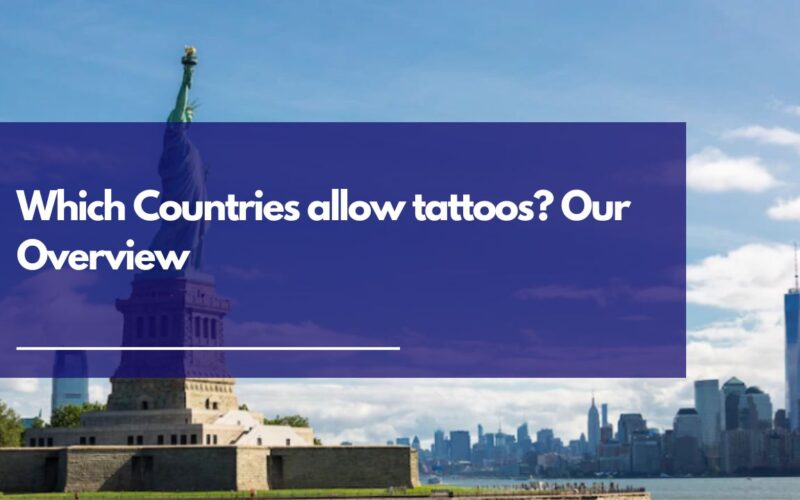As an Amazon Associate, I earn a small commission from qualifying purchases. Learn more about this.
Tattoos are personal.
They tell stories, commemorate moments, or simply serve as an expression of self.
But in the global travel arena, your ink might mean more than you think. Before you pack your bags and jet off, it’s worth noting that in some countries, the tattoos you sport could potentially impact your visa application process.
Are there countries that would outrightly reject visa applications for having tattoos?
There isn’t official documentation from any country that states they will outright reject visa applications solely based on the applicant having tattoos.
However, it’s important to note that some countries have very strict and conservative views towards tattoos, which can indeed lead to complications during the visa application process.
In countries where tattoos are closely associated with criminal activity or are deemed socially unacceptable, having visible tattoos can lead to additional scrutiny during visa processing.
This additional scrutiny might make the visa application process more challenging, as visa officers may conduct a more thorough examination of the applicant’s background and purpose of travel.
While the tattoos themselves may not be the primary reason for a visa rejection, they could indirectly contribute to the outcome of the visa application process.
For instance:
- In Japan, while tattoos are not an official reason for visa denial, individuals with visible tattoos may be subject to discrimination or exclusion from public places like onsen (hot springs) and gyms, as tattoos are often associated with the Yakuza (Japanese organized crime).
- In the United Arab Emirates and other Middle Eastern countries, tattoos, especially those that could be seen as offensive or anti-religious, might create complications, leading to extra scrutiny and potential issues in visa processing.
- In some countries, visa applicants are required to undergo a medical examination, and visible tattoos might be noted during this process, potentially leading to further questions and scrutiny.
To avoid complications, it’s recommended that individuals with tattoos conduct thorough research about the cultural attitudes towards tattoos in the country they plan to visit, and take appropriate measures, such as covering tattoos during visa interviews and other official processes, to minimize the likelihood of facing issues related to their tattoos.
Again, it’s crucial to emphasize that while having tattoos may lead to additional scrutiny, it is not a universally recognized or official reason for visa rejection in any country as of 2023.
Other countries with Potential Issues with Tattoos
1. South Korea

South Korea, land of K-pop, kimchi, and high-tech cities! But here’s something you might not know: tattoos are somewhat of a touchy subject.
Though you won’t have issues with visas or entry, be aware that only licensed medical practitioners are legally allowed to give tattoos, which makes it a bit of a gray area.
This has led to a cultural perspective where tattoos can sometimes be linked with gang affiliations or be viewed as rebellious. Especially if you’re thinking of heading to public baths or spas, you might get a few discreet (or not-so-discreet) glances.
2. Thailand
A favorite for many travelers, Thailand is known for its beautiful beaches, vibrant cities, and its rich Buddhist culture.
While many tourists get tattoos here, especially the famous Sak Yant (spiritual tattoos), there’s a line to tread carefully.
Tattoos of Buddha or other religious symbols can be deemed highly disrespectful if they’re placed on inappropriate parts of the body (like below the waist). In the past, there have been cases of tourists facing legal issues or deportation for having disrespectful religious tattoos.
3. Malaysia

Malaysia offers a rich blend of cultures, and it’s a must-visit for anyone craving adventure and diversity. However, it’s also predominantly Muslim, which means conservative values prevail.
Especially if you’re rocking tattoos with religious symbols, mythical creatures, or anything that might be seen as disrespectful, it’s wise to keep them covered when in public spaces.
4. China
In China, while the younger generation is progressively accepting tattoos, traditional sentiments still linger.
Tattoos are often associated with criminal activity, and individuals with visible tattoos may be barred from certain establishments like gyms, swimming pools, and upscale hotels. This may not impact your visa status, but it’s certainly a potential inconvenience to be aware of.
5. India
India, with its diverse and colorful cultural tapestry, does not have a nationwide perspective on tattoos.
However, it’s wise to note that in certain conservative or rural areas, tattoos, especially on women, might attract unwarranted attention and could be considered inappropriate. Balancing respect for local customs and traditions with self-expression is the key here.
Tips for Tattooed Travelers
1. Do Your Homework:
Research is your best friend. Before booking that flight, take the time to understand the cultural nuances of the country you plan to visit.
Learn about their perspectives on tattoos and if there are any specific rules or norms you should be aware of. Knowledge is power, and being well-informed beforehand can save you from potential hassles and ensure a more enjoyable trip.
2. Cover Up When Necessary:
In countries where tattoos are not widely accepted or may be misunderstood, it’s prudent to keep them covered.
Pack clothing that can easily conceal your tattoos, especially when visiting religious sites or conservative areas. It’s a simple step that can help avoid uncomfortable situations and ensure you are showing respect for local customs and traditions.
3. Be Prepared to Explain:
If your tattoos are visible, be prepared to explain them, especially if they include words or symbols from other languages or cultures.
People may be curious, and having a polite, concise explanation can help break the ice and avoid misunderstandings. A smile and a friendly attitude can go a long way in these situations.
4. Respect Local Customs and Laws:
This can’t be emphasized enough. Every country has its own set of laws, traditions, and cultural norms. Respecting these is paramount as a traveler.
If a country has specific rules regarding tattoos (for example, certain establishments in Japan barring entry to tattooed individuals), abide by them. It’s about mutual respect and ensuring your experiences in the country remain positive and enriching.
Conclusion
So, in wrapping up, while these countries may not have explicit tattoo restrictions impacting your visa or legal status as a visitor, it’s always smart to be in the know. Your travel experience can be so much smoother and enjoyable when you’re tuned into the cultural nuances and unspoken rules of the places you’re exploring.







